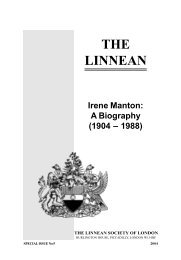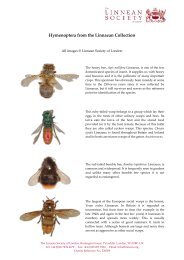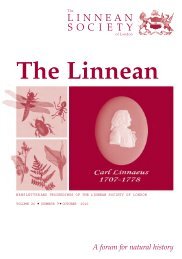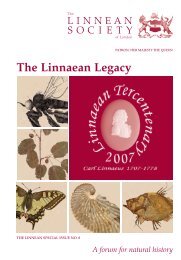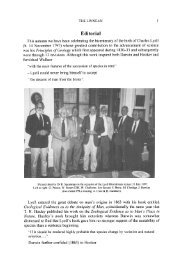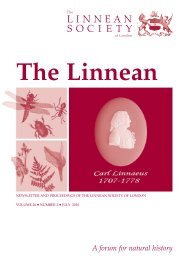Vol 25, no 3, October - The Linnean Society of London
Vol 25, no 3, October - The Linnean Society of London
Vol 25, no 3, October - The Linnean Society of London
You also want an ePaper? Increase the reach of your titles
YUMPU automatically turns print PDFs into web optimized ePapers that Google loves.
12<br />
THE LINNEAN 2009 VOLUME <strong>25</strong>(3)<br />
Indians and what would today be called caboclos in much more sympathic and<br />
respectful terms, <strong>no</strong>ting particularly how beautiful the women <strong>of</strong> the region were!<br />
(See the NOTE at the end <strong>of</strong> this essay.)<br />
Let us follow Darwin’s account further:<br />
“In the morning, the Captain sent a party to communicate with the Fuegians. When we<br />
came within hail, one <strong>of</strong> the four natives who were present advanced to receive us, and<br />
began to shout most vehemently, wishing to direct us where to land. When we were on<br />
shore the party looked rather alarmed, but continued talking and making gestures with<br />
great rapidity. It was without exception the most curious and interesting spectacle I had<br />
ever beheld. I could <strong>no</strong>t have believed how wide was the difference, between savage<br />
and civilized man. It is greater than between a wild and domesticated animal, in as much<br />
as in man there is a greater power <strong>of</strong> improvement.”<br />
<strong>The</strong> extraordinary thing about this passage is <strong>no</strong>t really the s<strong>no</strong>bbery <strong>of</strong> comparing<br />
a ‘savage’ with a wild animal, in comparison with a ‘civilized’ man who is compared<br />
with a domesticated animal. It is rather that, as Darwin would later show in On the<br />
Origin <strong>of</strong> Species, in the course <strong>of</strong> man’s domestication <strong>of</strong> animals and plants from<br />
wild precursors, their original ‘natures’ are lost, and replaced by artificial races that<br />
can <strong>no</strong> longer survive in nature. <strong>The</strong> latter owe their existence entirely to the species<br />
Homo sapiens sapiens; they are wholly dependent upon man, having been manipulated<br />
through breeding to yield what man wants, and to be tame, obedient, and subservient<br />
to man. In a sense <strong>of</strong> course, they are <strong>no</strong> more <strong>no</strong>r less ‘natural’ or ‘artificial’ than wild<br />
species, and <strong>no</strong> less ‘free’ or ‘unfree’. <strong>The</strong> only relevant criterion within the theory <strong>of</strong><br />
evolution is survival. Nevertheless, it is strange that this man, Charles Darwin, should<br />
prefer being similar to a domesticated animal than to a ‘wild’, ‘authentic’, ‘natural’<br />
one, especially when it is he who will unlock the great secret <strong>of</strong> biology, the theory <strong>of</strong><br />
evolution, as driven by ‘natural selection’. That human ‘improvement’ within<br />
‘civilization’ should seem analogous to being shaped into an obsequious and dependent<br />
condition by others purely for their exploitative convenience, might in fact be a very<br />
apt insight into the condition <strong>of</strong> the vast majority <strong>of</strong> people in civilizations based on<br />
social classes and hierarchical domination; yet for the fearless, rebellious scientist<br />
who was to enter with his mind into the wildest truths <strong>of</strong> organic nature, in an era still<br />
largely dominated by religious dogmas and unquestioned traditions, it can<strong>no</strong>t but appear<br />
amazing.<br />
Darwin continues:<br />
“<strong>The</strong> chief spokesman was old, and appeared to be the head <strong>of</strong> the family; the three<br />
others were powerful young men, about 6 feet high. <strong>The</strong> women and children had been<br />
sent away. <strong>The</strong>se Fuegians are a very different race from the stunted miserable wretches<br />
further to the westward, <strong>The</strong>y are much superior in person, and seem closely allied to<br />
the famous Patagonians <strong>of</strong> the Strait <strong>of</strong> Magellan. <strong>The</strong>ir only garment consists <strong>of</strong> a<br />
mantle made <strong>of</strong> guanaco skin, with the wool outside; this they wear just thrown over<br />
their shoulders, as <strong>of</strong>ten leaving their persons exposed as covered. <strong>The</strong>ir skin is <strong>of</strong> a<br />
dirty coppery red colour.”<br />
Darwin‘s observations become contradictory here: though these people are<br />
according to him ‘superior’ to the ‘stunted miserable wretches further to the westward’<br />
(in fact the first group must have been Haush or Selk’nam, the second Yámana). <strong>The</strong>y



